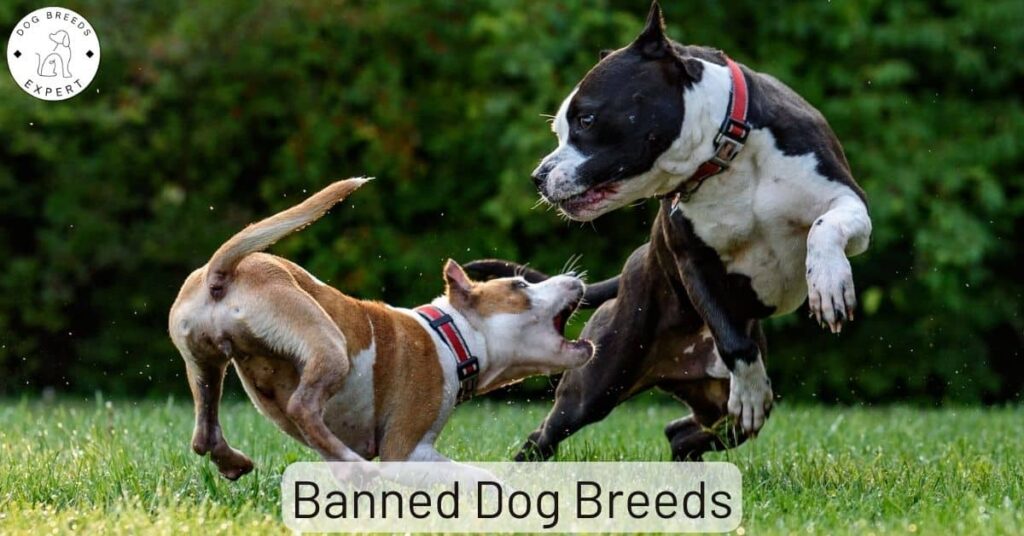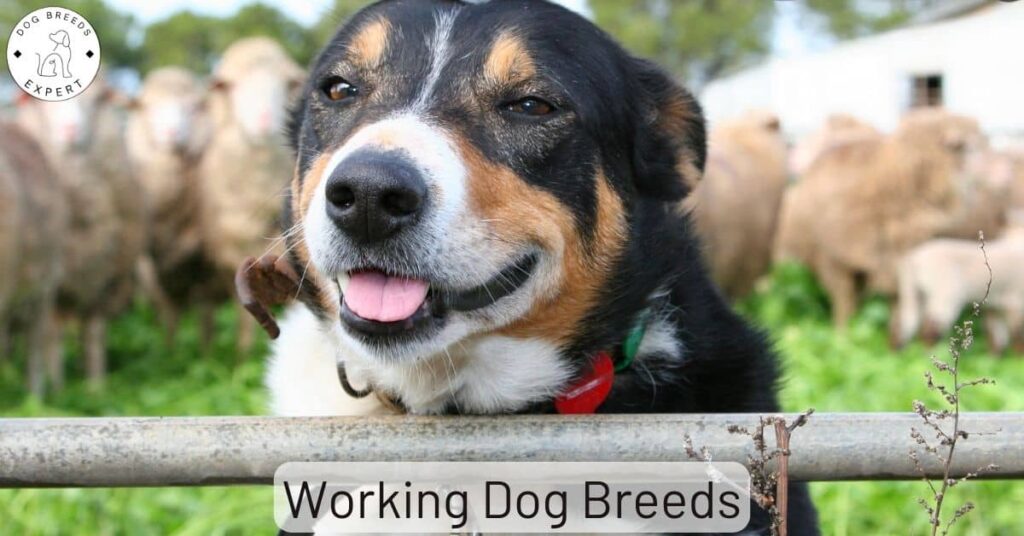Which are the most banned dog breeds?
The dog breeds which are banned outright in certain countries, or restricted and difficult to insure in others.
This list of banned dog breeds includes those breeds that are illegal to own in some countries, due to a perceived danger to the public. The government has deemed them to be dangerous dogs, in the interest of public safety. Sometimes the outright ban on ownership can be seen as sensible, but at other times the logic is doubtful. For example, some countries ban the pure-bred version as well as hybrid dogs – ie. mixed breeds that include part of the banned breed.
There are THREE types of restriction on dog ownership;
- Specific breeds that are are banned outright – ownership is illegal.
- Other that breeds are subject to an import ban. You cannot take the breed into the country.
- And then a 3rd category of breed is subject to license and certain restrictions on ownership.
AND even if the breed IS legal in your country, it may be difficult to include on your home or public liability insurance. So, if your dog causes an accident by running in front of a car, for example, you will be liable for all the resulting costs.
If your dog attacks and injures another dog – or worse, a human – you could well face a law suit for damages, loss of income, assault, permanent disfigurement etc. Dog bites can take up a lot of insurance company time. So study this list carefully and make sure you really know what you are taking on, if you really want one of these banned dog breeds.
In the United States, there is breed-specific legislation – (BSL) – that regulates ownership of certain breeds. BSL can range in severity and direction, for example, some BSL bans certain breeds from particular areas such as public beaches or parks, whereas other legislation bans the entire breed from towns altogether. In the past 20 years over 25 different breeds have been involved in dog bite fatalities.
Banned Dog Breeds
This list includes the most common breeds to be banned, but it is not exhaustive; rules and regulations may change from time to time, and a breed may be added to a banned list at short notice. If intend to travel with your dog to a different country, you should check with the local authorities about any restrictions or bans before planning your trip.
The following breeds are in alphabetical order, NOT in order of risk. Not all are recognized by the American Kennel Club.
Akita
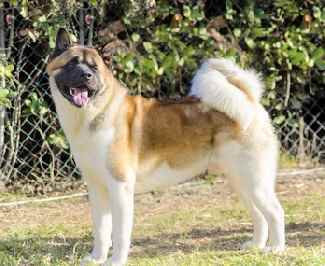
The American Akita doesn’t tend to play well with others. Don’t expect these dogs to be hospitable with other dogs, especially those of the same gender.
They also tend to view smaller pets as prey. They treat many new dogs that are trying to integrate into the home as suspicious as they would any unknown dog, especially those of the same sex.
If properly trained, these dogs can adapt to sharing their home, but for the most part, it’s not recommended. If you do decide to get two, the best choice would be to get one of each sex.
The Akita is banned in
- Malaysia,
- Singapore,
- Bermuda (restricted)
- USA – some states only
American Bulldog
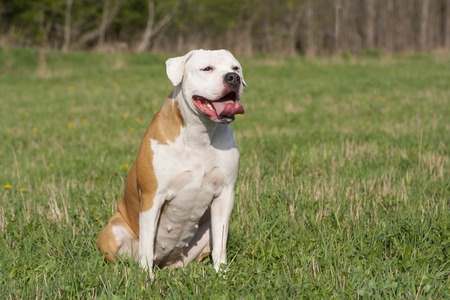
The American Bulldog is highly energetic and active and will require plenty of exercise. Exercise in the form of long daily walks will help, but daily romps and playtime are also necessary. Start slowly with very young puppies and work up to a comfortable exercise regime.
They are amazing jumpers due to their big muscles, and can be escape artists if there is a small opening in the fence. They have also been known to be diggers due to the Terrier breed in their heritage. As puppies, they can be rowdy and destructive if left alone for extended periods of time.
The American Bulldog is banned in;
- Bermuda, (import ban)
- Denmark,
- Malaysia,
- St. Kitts and Nevis,
- Singapore
- USA – some states only
American Pit Bull Terrier
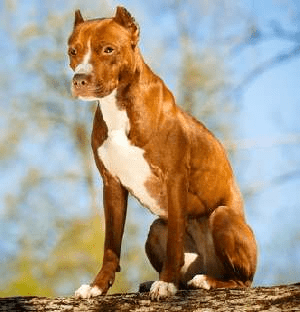
Both the American Pit Bull Terrier (APBT) and the American Staffordshire Terrier (AST) descended from a group of old style Bulldogs and old style terriers that were present in the 1800s both in the UK and in the United States.
Both breeds were originally developed for bull baiting, dog fighting, farm work and to serve as a guardian of people and property in their respective countries. Both breeds look similar to each other, but the differences lie in the dog registries that recognized the breeds at the time.
American Pit Bull Terriers were acknowledged by the United Kennel Club in 1898 as their very first breed. At that point in the history of the U.S., dog fighting was considered a sport and in the dog world, to receive their “championship” they had to win three fights.
Pit Bulls seem to come in for special attention. The American Pit Bull Terrier (Also Pit Bull Terrier) and pretty much anything that LOOKS like a Pit Bull Terrier (unless accompanied by a vet’s statement that the dog is NOT a Pit Bull) is banned in;
- Australia (cannot be imported)
- Bermuda (cannot be imported)
- Canada -Manitoba (Winnipeg) and Ontario
- Colombia
- Cyprus ( (import ban))
- Denmark
- Germany ( (import ban))
- Hong Kong
- Israel (unless licenced)
- Malasia
- New Zealand
- Puerto Rico (cannot be imported)
- St. Kitts and Nevis (cannot be imported)
- St. Lucia (cannot be imported)
- Singapore
- Thailand (cannot be imported)
- United Arab Emirates (cannot be imported)
- United Kingdom
- USA – some states only
American Staffordshire Terrier
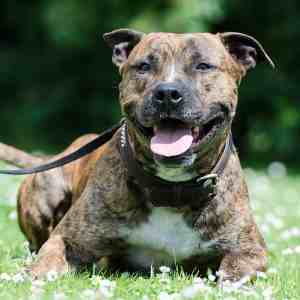
To some, the American Staffordshire Terrier means only one thing – – PIT BULL – – and with that comes all the negative propaganda that has spread throughout the news at every level, prompting breed bands and high insurance rates.
To many, all they see is a vicious fighting dog that should be banned if not destroyed. Just how much of this rhetoric is accurate of this breed?
It is true that the American Staffordshire Terrier has suffered and gained a bad reputation. However, while they are strong, powerful, and courageous, they are not vicious.
The American Staffordshire Terrier is banned in;
- Bermuda (cannot be imported)
- Canada -Manitoba (Winnipeg) and Ontario
- Colombia (cannot be imported)
- Denmark
- Germany (cannot be imported)
- Hong Kong (Licence required)
- Israel (Licence required)
- Malaysia
- Puerto Rico
- Qatar
- St. Kitts and Nevis (cannot be imported)
- St. Lucia (cannot be imported)
- Singapore
- Thailand
- UAE
Boerboel
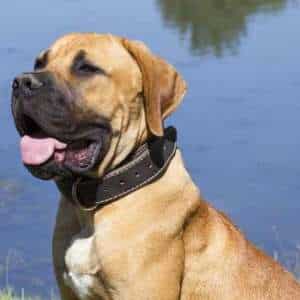
The African Boerboel dog breed is banned in;
- Bermuda (cannot be imported)
- Denmark
- Qatar
- Singapore
Cane Corso
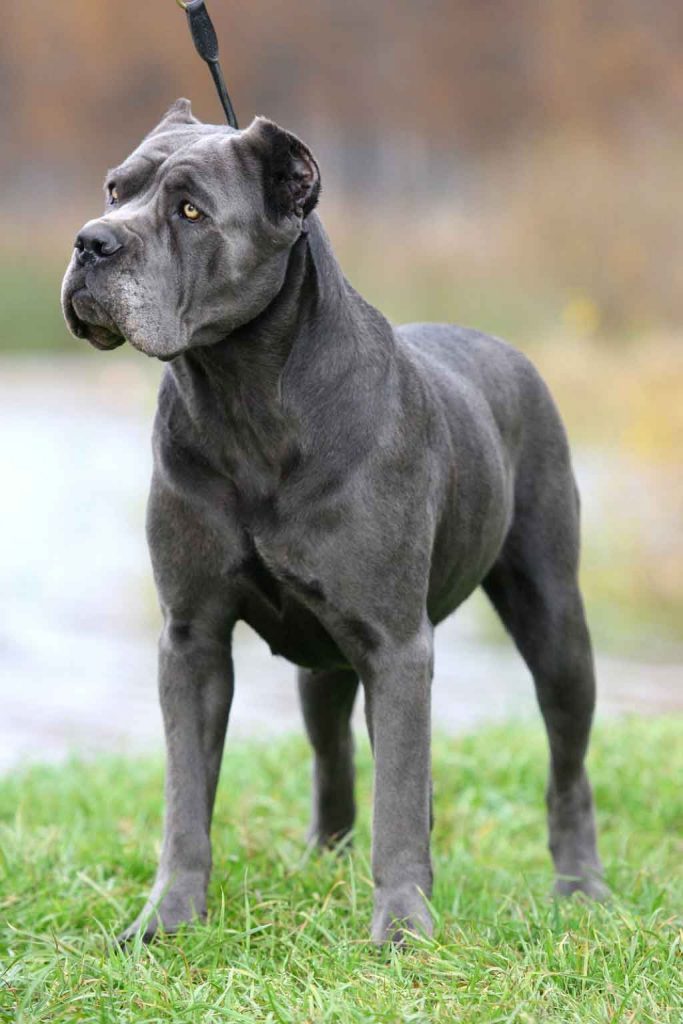
The Cane Corso breed (Italian Mastiff) is a big-boned and muscular dog of the mastiff type, more athletic than an English Mastiff, and not as heavy as its cousin the Neapolitan Mastiff, but still very imposing and intimidating. Some people refer to the breed as the ‘Mike Tyson of the dog world’. Perhaps surprisingly, the Cane Corso is only banned in 2 countries.
The Cane Corso is banned in;
- Bermuda
- USA – some states only
Dogo Argentino (Argentine Mastiff)

The Dogo Argentino is not as common as other large breed guarding dogs, like the German Shepherd, but his loyalty, fearlessness and loving personalities make him a good family dog.
Unfortunately, because of the Dogo’s athleticism and hunting abilities, he has become the breed of choice for some dog fighters and has been given an aggressive reputation.
He is still banned in some countries including the UK, New Zealand, Norway, Denmark, Iceland, Singapore, Ukraine and Israel.
The Dogo Argentino (or Argentine Mastiff) is banned in;
- Australia
- Bermuda (cannot be imported)
- Cyprus
- Denmark
- Hong Kong
- Israel
- Malaysia
- New Zealand
- St. Kitts and Nevis
- St. Lucia
- Singapore
- UAE
- United Kingdom
Fila Brasileiro
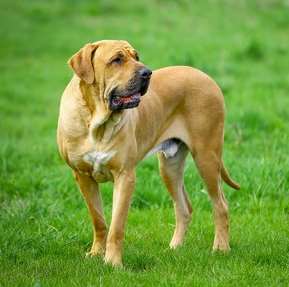
The Fila Brasileiro (or Brazilian Mastiff) is banned in;
- Australia
- Bermuda (cannot be imported)
- Cyprus
- Denmark
- Hong Kong
- Israel
- Malaysia
- New Zealand
- St. Kitts and Nevis
- St. Lucia
- Singapore
- UAE
- United Kingdom
Japanese Tosa (Tosa Inu)
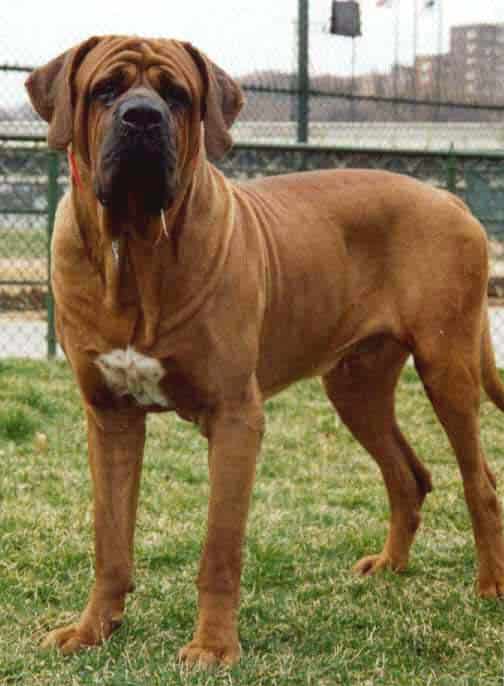
This is not a dog for first time owners or the elderly/infirm and not recommended for apartment dwellings or multiple dog households.
Due to his Japanese dog fighting history, the Japanese Tosa is banned in Australia, Cyprus, Denmark, Iceland, Malaysia, Malta, New Zealand, Norway and Turkey.
He is regulated in Trinidad and Tobago and the UK under The Dangerous Dog Act and is banned from all council properties by Dublin City Council (Ireland).
Many insurance companies will not insure Tosas or other Japanese Fighting Dogs such as the Akita-Inu.
The following countries have banned the Japanese Tosa (also called the Tosa Inu);
- Australia
- Bermuda (cannot be imported)
- Cyprus
- Denmark
- Hong Kong
- Israel
- Malaysia
- New Zealand
- St. Kitts and Nevis
- St. Lucia
- Singapore
- UAE
- United Kingdom
Neapolitan Mastiff
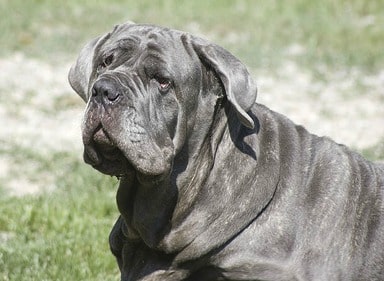
Although Neapolitans are protective of their family, which includes any children, they are not recommended as family pets.
They can knock over small children, hurt older children without meaning to and are suspicious of any visiting children who they don’t recognize no matter how much socialization they’ve been given.
They may display aggression to other dogs especially dogs of the same sex although they can be relatively tolerant of other household pets provided they are raised together.
Not suitable for apartments, inexperienced owners, families with children, multi-dog households,the elderly/infirm or hot climates.
The Neapolitan Mastiff is banned in;
- Bermuda (cannot be imported without a licence)
- Malaysia
- Qatar
- Singapore
Perro de Presa Canario
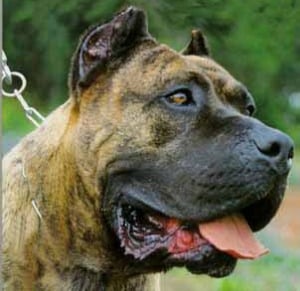
The Presa Canario is banned in;
- Australia
- Bermuda
- New Zealand
- St. Kitts and Nevis
- Singapore
- USA – some states only
Rottweiler
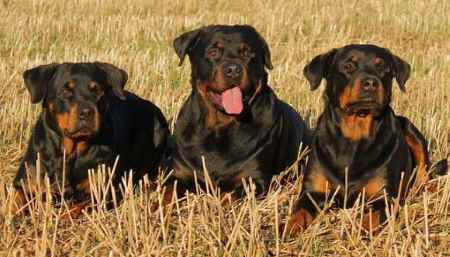
Rotties are often portrayed in a bad light, as aggressive, angry dogs. This is not true, yet it can be the case depending on the dog’s upbringing. They are really just very perceptive of the emotions directed at them. Should they be abused, neglected, or otherwise ignored by their owner, they can become aggressive and dangerous on the whole.
Rottweilers are known to pack a punch. They are famous for their exceptional strength. The extra muscle power they wield is particularly helpful while working as it makes them capable of herding animals of various sizes, even cows! The intimidation factor they bring to the table can frighten people, though, so it’s important to make sure they know the dog is not a threat.
The Rottweiler is banned in;
- Bermuda – restricted breed
- Israel (license required)
- Malaysia – restricted breed
- Qatar
Staffordshire Bull Terrier
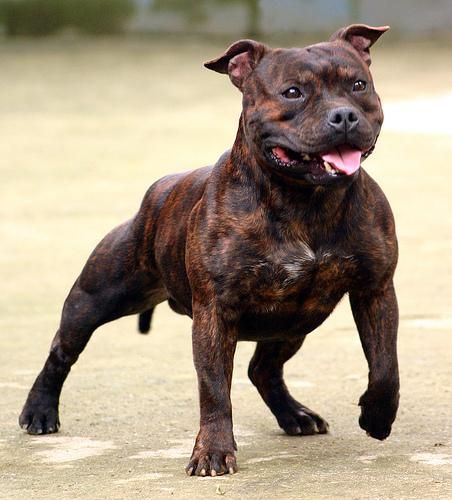
But this breed has always been a family pet breed, even in its dog fighting past. They like being in a family situation, and are very good with children, and have even been called the Nanny Dog! The U.K. Kennel Club lists the Staffie as a breed suitable for families. So, in fact, this IS a big softie masquerading as a street fighter.
However, there IS that dog fighting past which has left an ingrained tendency to face off against other unfamiliar or strange dogs. If this issue is addressed when the dog is a puppy by proper socialization and subsequent training, the Staffie grows into the perfect family dog. However, you should always deal with a reputable breeder.
The Staffordshire Bull Terrier is banned in;
- Bermuda – restricted breed
- Canada -Manitoba (Winnipeg) and Ontario
- Germany (licence required)
- Hong Kong (statutory declaration required)
- Israel
- Malaysia
- Puerto Rico
- Qatar
- St. Kitts and Nevis
- St. Lucia
- Singapore
- USA – some states only
Wolf – including hybrids
The following countries have banned wolves and crossed dog/wolf breeds;
- Australia
- Bermuda
- UAE
- USA – some states only
You have probably noticed that certain countries have banned many more breeds than others. The following countries have the most banned breeds and restrictions;
- Bermuda – 13 breeds are banned, and another 14 breeds are restricted.
- Qatar – 14 breeds banned.
- Denmark – 13 breeds banned, including the Caucasian Shepherd Dog and the Kangal Shepherd Dog.
- Malaysia – 8 breeds are banned, and 6 other breeds are restricted.
- Singapore – 11 breeds are banned.
Also, you may have wondered at the omission of some breeds, like German Shepherds, Doberman Pinschers, the Chow Chow, Alaskan Malamute, Great Dane, the Bully Kutta, Gull Terr and perhaps Rhodesian Ridgeback. Some of these breeds are virtually unknown in the Western world, while others may be subject to registration and some restrictions on ownership in some countries; but they have not been banned outright.
In the United States, the situation is complicated by Breed Specific Laws (or Breed Specific Legislation) that vary from state to state; Also some states DO NOT have Breed Specific Laws at all. They are;
- Nevada
- Utah
- Arizona
- Texas
- Oklahoma
- South Dakota
- Minnesota
- Virginia
- Pennsylvania
- Connecticut
- Rhode Island
- Massachusetts
- New Hampshire
- Maine
- Alaska
- Hawaii
- New Jersey
- New York
The most common breeds banned by Breed Specific Legislation include the following;
- Pit Bull
- Bullmastiff
- American Staffordshire Terrier
- Belgian Malinois
- Dogo Argentino
- Doberman Pinscher
- Cane Corso
- German Shepherd
- Rottweiler
- Alaskan Malamute
- Siberian Husky
- Presa Canario
- Bull Terrier
- Staffordshire Bull Terrier
- Wolf Hybrids
- American Bulldog
- Akita
- Chow Chow
We hope our guide to the most banned dog breeds has been interesting and useful. Please tell us your own experiences, using the Contact Me link. Thank you!

